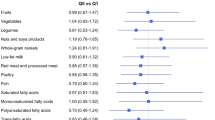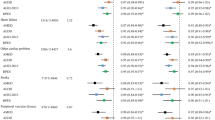Abstract
Background/Objectives:
To study quality of diet in relation to all-cause mortality, cardiovascular disease (CVD) and cancer mortality.
Subjects/Methods:
The population-based prospective Cohort of Swedish Men (COSM) included 40 837 men, 45–79 years of age, who filled in a FFQ (96 food items) and were CVD- and cancer-free at baseline. Quality of diet was assessed by Recommended Food Score (RFS) based on 36 items and Non-Recommended Food Score (Non-RFS) based on 16 items. Cox's proportional hazards regression models were used to estimate the hazard ratios (HRs) of mortality and 95% confidence intervals (CIs). Multivariate HRs for RFS and Non-RFS were adjusted for age, education, physical activity, martial status, self-perceived health status, smoking status, dietary supplements use, WHR, alcohol use, intake of energy and mutually adjusted.
Results:
Between 1998 and 2005, 4501 deaths from all-causes were registered. Between 1998 and 2003, there were 1394 CVD and 759 cancer deaths. High RFS (⩾28) compared with low (⩽20) was associated with lower risk of all-cause mortality (HR: 0.81; 95% CI: 0.71–0.91; P-value for trend<0.0001) and CVD mortality (HR: 0.71; 95% CI: 0.54–0.93; P-value for trend=0.003). In contrast, men with high Non-RFS (⩾5) had higher risk of all-cause (HR: 1.21; 95% CI: 1.09–1.34; P-value for trend=0.001) and CVD mortality (HR: 1.27; 95% CI: 1.05–1.54; P-value for trend=0.07) compared to those with low Non-RFS (⩽2 items). No significant associations with cancer mortality were observed.
Conclusions:
Both measures of diet quality, RFS and Non-RFS, showed statistically significant associations with all-cause and CVD mortality (recommended foods inversely while nonrecommended foods positively), but not with cancer mortality.
This is a preview of subscription content, access via your institution
Access options
Subscribe to this journal
Receive 12 print issues and online access
$259.00 per year
only $21.58 per issue
Buy this article
- Purchase on Springer Link
- Instant access to full article PDF
Prices may be subject to local taxes which are calculated during checkout

Similar content being viewed by others
References
Bergstrom L, Kylberg E, Hagman U, Erikson H, Bruce A (1991). The food composition database KOST: the National Administration's information system for nutritive values of food. Var Foda 43, 439–447.
Bingham SA, Luben R, Welch A, Wareham N, Khaw KT, Day N (2003). Are imprecise methods obscuring a relation between fat and breast cancer? Lancet 362, 212–214.
Freedman LS, Potischman N, Kipnis V, Midthune D, Schatzkin A, Thompson FE et al. (2006). A comparison of two dietary instruments for evaluating the fat-breast cancer relationship. Int J Epidemiol 35, 1011–1021.
Genkinger JM, Platz EA, Hoffman SC, Comstock GW, Helzlsouer KJ (2004). Fruit, vegetable, and antioxidant intake and all-cause, cancer, and cardiovascular disease mortality in a community-dwelling population in Washington County, Maryland. Am J Epidemiol 160, 1223–1233.
Haveman-Nies A, de Groot L, van Staveren W (2003). Relation of dietary quality, physical activity, and smoking habits to 10-year changes in health status in older Europeans in the SENECA study. Am J Public Health 93, 318–323.
Hu FB, Manson JE, Willett WC (2001). Types of dietary fat and risk of coronary heart disease: a critical review. J Am Coll Nutr 20, 5–19.
Hu FB, Willett WC (2002). Optimal diets for prevention of coronary heart disease. JAMA 288, 2569–2578.
Huijbregts P, Feskens E, Rasanen L, Fidanza F, Nissinen A, Menotti A et al. (1997). Dietary pattern and 20 year mortality in elderly men in Finland, Italy, and the Netherlands: longitudinal cohort study. BMJ 315, 13–17.
Kant AK, Schatzkin A, Graubard BI, Schairer C (2000). A prospective study of diet quality and mortality in women. JAMA 283, 2109–2115.
Kennedy E, Ohls J, Carlson S, Fleming K (1995). The Healthy Eating Index: design and applications. J Am Diet Assoc 95, 1103–1108.
Knoops KT, de Groot LC, Kromhout D, Perrin AE, Moreiras-Varela O, Menotti A et al. (2004). Mediterranean diet, lifestyle factors, and 10-year mortality in elderly European men and women: the HALE project. JAMA 292, 1433–1439.
Kristal AR, Peters U, Potter JD (2005). Is it to abandon the food frequency questionnaire? Cancer Epidemiol Biomarkers Prev 14, 2826–2828.
Kushi LH, Meyer KA, Jacobs DR (1999). Cereals, legumes, and chronic disease risk reduction: evidence from epidemiologic studies. Am J Clin Nutr 70, 451S–458S.
Lagiou P, Trichopoulos D, Sandin S, Lagiou A, Mucci L, Wolk A et al. (2007). Mediterranean dietary pattern and mortality among young women: a cohort study in Sweden. Br J Nutr 96, 384–392.
Messerer M, Johansson SE, Wolk A (2004). The validity of questionnaire-based micronutrient intake estimates is increased by including dietary supplement use in Swedish men. J Nutr 134, 1800–1805.
Michels KB, Wolk A (2002). A prospective study of variety of healthy foods and mortality in women. Int J Epidemiol 31, 847–854.
Norman A, Bellocco R, Bergstrom A, Wolk A (2001). Validity and reproducibility of self-reported total physical activity—differences by relative weight. Int J Obes Relat Metab Disord 25, 682–688.
Osler M, Heitmann BL, Hoidrup S, Jorgensen LM, Schroll M (2001). Food intake patterns, self rated health and mortality in Danish men and women. A prospective observational study. J Epidemiol Community Health 55, 399–403.
Popkin BM, Siega-Riz AM, Haines PS (1996). A comparison of dietary trends among racial and socioeconomic groups in the United States. N Engl J Med 335, 716–720.
Report WHO/FAO (2003). Diet, Nutrition and the Prevention of Chronic Diseases. Joint WHO/FAO Expert Consultation. No. 916, Geneva.
Seymour J, Calle E, Flagg E, Coates R, Ford E, Thun M (2003). Diet Quality Index as a predictor of short-term mortality in the American Cancer Society Cancer Prevention Study II Nutrition Cohort. Am J Epidemiol 157, 980–988.
Shimazu T, Kuriyama S, Hozawa A, Ohmori K, Sato Y, Nakaya N et al. (2007). Dietary patterns and cardiovascular disease mortality in Japan: a prospective cohort study. Int J Epidemiol 36, 600–609.
Trichopoulou A, Bamia C, Trichopoulos D (2005a). Mediterranean diet and survival among patients with coronary heart disease in Greece. Arch Intern Med 165, 929–935.
Trichopoulou A, Costacou T, Bamia C, Trichopoulos D (2003). Adherence to a Mediterranean diet and survival in a Greek population. N Engl J Med 348, 2599–2608.
Trichopoulou A, Oouris-Blazos A, Wahlqvist M, Gnardellis C, Lagiou P, Polychronopoulos E et al. (1995). Diet and overall survival in elderly people. BMJ 311, 1457–1460.
Trichopoulou A, Orfanos P, Norat T, Bueno-de-Mesquita B, Ocke MC, Peeters PH et al. (2005b). Modified Mediterranean diet and survival: EPIC-elderly prospective cohort study. BMJ 330, 991–994.
Willett WC (1994). Diet and health: what should we eat? Science 264, 532–537.
Acknowledgements
This study was supported by the Swedish Council for Working Life and Social Research and by the Swedish Research Council.
Author information
Authors and Affiliations
Corresponding author
Additional information
Contributors: JK, AB and AW were responsible for the study concept and design, AW was responsible for data collection, JK and NH performed statistical analyses, JK wrote the manuscript. AB, JK, NH and AW were responsible for interpreting the results and for critical revision of the manuscript. None of the authors had any financial or personal conflicts of interest. All authors contributed to the final version of the paper and gave their approval to publish this final version.
Rights and permissions
About this article
Cite this article
Kaluza, J., Håkansson, N., Brzozowska, A. et al. Diet quality and mortality: a population-based prospective study of men. Eur J Clin Nutr 63, 451–457 (2009). https://doi.org/10.1038/sj.ejcn.1602968
Received:
Revised:
Accepted:
Published:
Issue Date:
DOI: https://doi.org/10.1038/sj.ejcn.1602968
Keywords
This article is cited by
-
Association of dietary diversity with total mortality and major causes of mortality in the Japanese population: JPHC study
European Journal of Clinical Nutrition (2020)
-
Long-term unprocessed and processed red meat consumption and risk of chronic obstructive pulmonary disease: a prospective cohort study of women
European Journal of Nutrition (2019)
-
Association of dietary variety with body composition and physical function in community-dwelling elderly Japanese
The Journal of nutrition, health and aging (2016)
-
Cardiovascular health: a cross-national comparison between the Maine Syracuse Study (Central New York, USA) and ORISCAV-LUX (Luxembourg)
BMC Public Health (2014)
-
Cardiovascular health and arterial stiffness: the Maine-Syracuse Longitudinal Study
Journal of Human Hypertension (2014)



